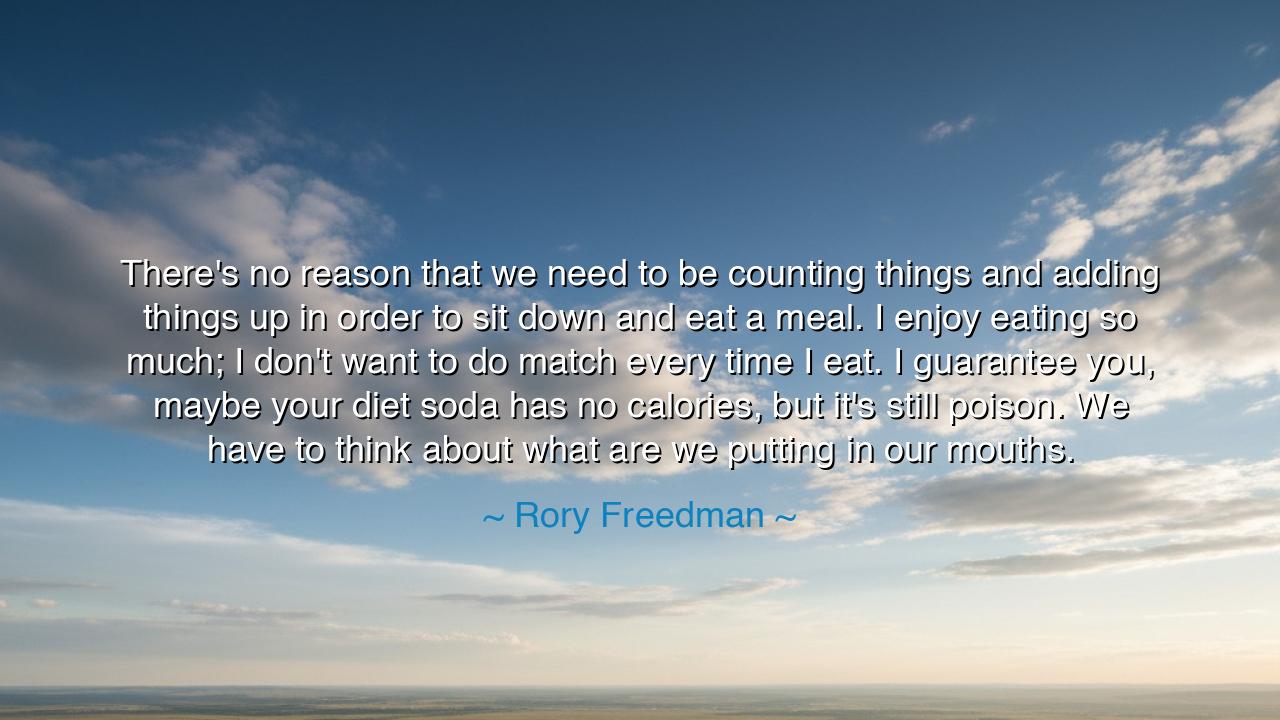
There's no reason that we need to be counting things and adding
There's no reason that we need to be counting things and adding things up in order to sit down and eat a meal. I enjoy eating so much; I don't want to do match every time I eat. I guarantee you, maybe your diet soda has no calories, but it's still poison. We have to think about what are we putting in our mouths.






The words “There’s no reason that we need to be counting things and adding things up in order to sit down and eat a meal. I enjoy eating so much; I don’t want to do math every time I eat. I guarantee you, maybe your diet soda has no calories, but it’s still poison. We have to think about what we are putting in our mouths” by Rory Freedman are not merely a reflection on food — they are a call to awaken, to restore sacred balance between the body and the spirit. In a world obsessed with counting, calculating, and controlling, Freedman reminds us that eating — the most natural act of life — has been stripped of its soul. Her words are a plea to return to intuition, to eat not with fear, but with awareness; not with numbers, but with gratitude.
To “count things and add things up” is the mark of an age that has forgotten how to feel. In ancient times, food was ritual — an offering, a communion between human and earth. Every meal was a gift, every grain and fruit a fragment of the divine. But now, modern man, armed with his charts and formulas, approaches his meal as if it were a battle to be calculated and won. Freedman’s rebellion against this way of life is not laziness — it is wisdom. She rejects the tyranny of the calorie and the spreadsheet, and reclaims the joy of being alive. To “do math every time we eat” is to live in constant tension with the body, as if nourishment were an enemy to be managed rather than a friend to be embraced.
Her warning about the “diet soda” — that it “has no calories but is still poison” — reveals a deeper truth about the illusions of modern convenience. The world promises us shortcuts: sugarless sweets, fat-free indulgence, tasteless abundance. Yet behind these masks lies corruption — food stripped of vitality, flavor, and authenticity. Freedman’s insight is not about soda alone; it is about the way we are seduced by appearances. We seek what is light on the scale but heavy with chemicals; what flatters our vanity but betrays our health. In her voice echoes the wisdom of the ancients, who taught that poison often wears the mask of sweetness, and that purity lies not in what is absent, but in what is real.
Consider the example of the ancient Roman philosopher Seneca, who lived simply while surrounded by luxury. He warned his fellow citizens that indulgence disguised as progress would destroy them. The Romans, much like us, had learned to feast without thought, to invent flavors rather than honor them. They counted their pleasures as we count our calories — and in doing so, they lost the art of moderation. Seneca taught that to live well was not to eat less, but to eat wisely. Freedman’s words echo his spirit, reminding us that true nourishment does not come from restraint, but from consciousness — from asking not “how much” but “what” and “why.”
Her teaching carries both tenderness and fire. To say “we have to think about what we are putting in our mouths” is to demand a kind of reverence for life. Food is not fuel alone; it is a conversation between the earth and the body, between the farmer and the soul. To eat thoughtlessly — to consume what poisons us in the name of convenience — is to break that sacred dialogue. But to eat with awareness, with gratitude for every flavor and every breath, is to live in alignment with nature’s rhythm. Freedman’s words challenge us to awaken our senses — to see, taste, and feel what we have long ignored in the haste of modern living.
There is also compassion in her rebellion. She does not tell us to reject pleasure, but to reclaim it. “I enjoy eating so much,” she says — and in those words is the secret of wisdom. Joy is not the enemy of health; it is its companion. To savor one’s food, to eat slowly, to feel nourished rather than stuffed — these are not luxuries, but sacred acts. The wise do not fear their appetites; they understand them. The glutton eats without thought, and the ascetic starves without joy, but the enlightened one eats with love and balance, honoring both body and spirit.
So, dear listener, take this lesson into your life: eat with awareness, not anxiety. Let each meal be an act of gratitude, not calculation. When you sit before your food, remember the soil, the sun, and the hands that brought it to you. Turn away from poisons that promise convenience, and seek instead what is whole, what is real. Do not count your nourishment in numbers, but in energy, vitality, and peace. For as Rory Freedman teaches, eating is not a science of fear, but an art of living — a sacred ritual in which the body is fed, the heart rejoices, and the soul remembers that it is, still and always, a part of the earth.






AAdministratorAdministrator
Welcome, honored guests. Please leave a comment, we will respond soon